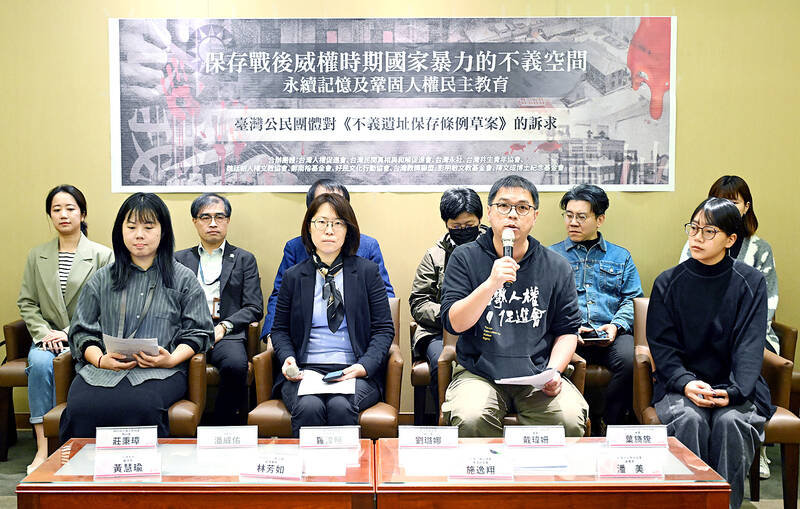The legislature’s Education and Culture Committee yesterday failed to pass a preliminary review of a draft act on the preservation of sites of injustice, as lawmakers could not agree on how to properly address historical sites and historical periods that the draft act would cover.
The National Human Rights Museum’s archive for historical sites of injustice defines “sites of injustice” as those where rulers during the authoritarian era — between Aug. 15, 1945 and Nov. 6, 1992 — contravened human rights by crushing protesters, committing extrajudicial executions, or abusing police or judicial systems to arrest, detain, rape, interrogate, judge, imprison, execute or bury people.
While the Executive Yuan’s version of the draft act adopts the same definition and limits the purview of the bill to sites where injustices were committed between those dates, Chinese Nationalist Party (KMT) Legislator Sra Kacaw and Non-Party Solidarity Union Legislator May Chin (高金素梅) — both representatives of indigenous constituents — proposed that the rulers of the Japanese colonial era between 1895 and 1945, and the Qing Dynasty be included as well.

Photo: Liao Chen-huei, Taipei Times
As lawmakers at the committee failed to reach a consensus on most of the articles, Democratic Progressive Party (DPP) Legislator Fan Yun (范雲), who convened the meeting, ruled to review the draft another time.
Aside from the periods that should be covered in the act, lawmakers also shared different thoughts about whether the sites should be called “sites of injustice” or “human rights historical sites.”
DPP Legislator Lin I-chin (林宜瑾) said that the act should specifically address violence committed by the authoritarian regime against individuals, which should be treated as a separate matter from that committed by colonial regimes.
“Each era has its unique historical background and there should be different remedies for violence in different eras. Including all human rights violations, regardless of the eras in which they happened, would undermine the progress that has already been made in transitional justice. Neither would it help us to deliver a proper review of issues related to state violence,” Lin said.
Sra Kacaw said that indigenous people endured injustices committed by every ruler of Taiwan, and therefore, the act should address all these injustices and all the historical sites related to them.
Groups advocating for transitional justice also criticized the KMT’s version of the act, saying that it was meant to confuse the public about its perception of the authoritarian regime and diminish the brutality of state violence.
“By proposing to expand the time periods covered by the act, is the KMT being serious about addressing issues of transitional justice by tackling its history of ruling through an authoritarian regime? Are they using ‘historical justice’ to confuse the public?” Taiwan Youth Association of Transitional Justice and Kiong-Seng secretary-general Pan Mei (潘美) said.
Pan also urged the legislature to pass the draft act to preserve the sites of injustice.
The National Human Rights Museum has listed 42 confirmed sites of injustice and 64 potential sites of injustice, but the landscape of many of the sites has changed, and the few that remain need urgent repairs, they said.
Without the act, they would not be preserved and might soon be demolished, they added.

Chinese Nationalist Party (KMT) Chairman Eric Chu (朱立倫), spokeswoman Yang Chih-yu (楊智伃) and Legislator Hsieh Lung-chieh (謝龍介) would be summoned by police for questioning for leading an illegal assembly on Thursday evening last week, Minister of the Interior Liu Shyh-fang (劉世芳) said today. The three KMT officials led an assembly outside the Taipei City Prosecutors’ Office, a restricted area where public assembly is not allowed, protesting the questioning of several KMT staff and searches of KMT headquarters and offices in a recall petition forgery case. Chu, Yang and Hsieh are all suspected of contravening the Assembly and Parade Act (集會遊行法) by holding

PRAISE: Japanese visitor Takashi Kubota said the Taiwanese temple architecture images showcased in the AI Art Gallery were the most impressive displays he saw Taiwan does not have an official pavilion at the World Expo in Osaka, Japan, because of its diplomatic predicament, but the government-backed Tech World pavilion is drawing interest with its unique recreations of works by Taiwanese artists. The pavilion features an artificial intelligence (AI)-based art gallery showcasing works of famous Taiwanese artists from the Japanese colonial period using innovative technologies. Among its main simulated displays are Eastern gouache paintings by Chen Chin (陳進), Lin Yu-shan (林玉山) and Kuo Hsueh-hu (郭雪湖), who were the three young Taiwanese painters selected for the East Asian Painting exhibition in 1927. Gouache is a water-based

Taiwan would welcome the return of Honduras as a diplomatic ally if its next president decides to make such a move, Minister of Foreign Affairs Lin Chia-lung (林佳龍) said yesterday. “Of course, we would welcome Honduras if they want to restore diplomatic ties with Taiwan after their elections,” Lin said at a meeting of the legislature’s Foreign Affairs and National Defense Committee, when asked to comment on statements made by two of the three Honduran presidential candidates during the presidential campaign in the Central American country. Taiwan is paying close attention to the region as a whole in the wake of a

OFF-TARGET: More than 30,000 participants were expected to take part in the Games next month, but only 6,550 foreign and 19,400 Taiwanese athletes have registered Taipei city councilors yesterday blasted the organizers of next month’s World Masters Games over sudden timetable and venue changes, which they said have caused thousands of participants to back out of the international sporting event, among other organizational issues. They also cited visa delays and political interference by China as reasons many foreign athletes are requesting refunds for the event, to be held from May 17 to 30. Jointly organized by the Taipei and New Taipei City governments, the games have been rocked by numerous controversies since preparations began in 2020. Taipei City Councilor Lin Yen-feng (林延鳳) said yesterday that new measures by